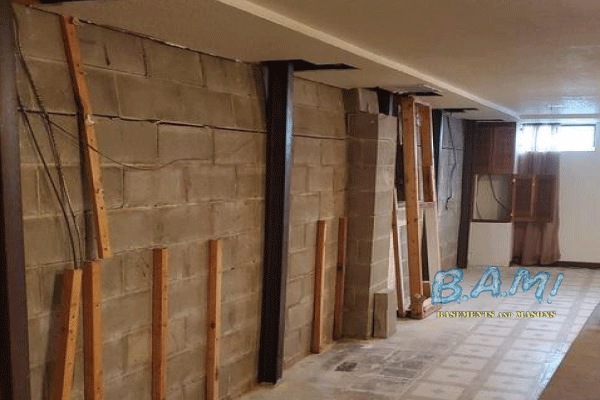The Buzz on Best Basement Waterproofing
The Buzz on Best Basement Waterproofing
Blog Article
The Basic Principles Of Best Basement Waterproofing
Table of ContentsNot known Facts About Best Basement WaterproofingExamine This Report on Best Basement WaterproofingExamine This Report on Best Basement WaterproofingWhat Does Best Basement Waterproofing Mean?The Buzz on Best Basement Waterproofing
usages excavation techniques toward the bottom of the structure's foundation. entails removing dampness after it has actually gotten in the cellar. AdvantaClean's experienced specialists and professionals will certainly locate the water source. If wall or piece splits are present, we will inject polyurethane and epoxies right into the splits and secure the compromise, preventing further moisture from going into.
If there's condensation on the exterior of the aluminum foil, you have high moisture in your cellar. If the aluminum foil has condensation on the inside surface area (next to the wall), the dirt around your house might be naturally damp from a high water table or inadequate dirt drain.
You can waterproof just your interior wall surfaces, which may address the issue. Or you can waterproof your outside wall surfaces, which is a much better wager however more pricey. Right here's the inside story on the different types: These thick coverings are cement-like. Once they dry out, they stick permanently to concrete and stonework walls (Best Basement Waterproofing).
Best Basement Waterproofing for Dummies
Concrete water resistant coatings can not be used to formerly painted surfaces; examine the tag. Recognized as densifiers, they are suitable only for walls that haven't been repainted or secured.
But you comb, roll, or spray it on a lot more heavily one gallon covers simply 75 square feet, not the 300 square feet common with typical paint. Water resistant paint is fine for DIY application. You can use it over repainted surface areas, and paint over it once it's treated (one gallon costs $37).
It can set you back $10,000 to $15,000, depending upon the work needed. Outside waterproofing entails digging deep into throughout your home fully deepness of the foundation wall surfaces, then installing a waterproof finish or membrane topped by drainage panels. The panels provide a very easy course for water to move to an external French drainpipe at the end of your structure.
We've all been captured in a storm without umbrella or raincoat (Best Basement Waterproofing). And it's constantly a recipe for calamity: everything's damp, your hairdo is ruined, and points are obtaining moldy. A basement without waterproofing is type of like that. Minus the ruined hairstyle part. Your cellar does not intend to undergo a rainstorm without correct security simply as much as you do not desire to.
The Single Strategy To Use For Best Basement Waterproofing
However if you've done your research study, you would certainly recognize there are 2 kinds of waterproofing: inside and exterior. It can get puzzling what they both mean, which one's a much Click This Link better investment, and what will in fact maintain the water out. Do not stress, we created this blog site to conveniently define both approaches for you and discuss the advantages and disadvantages of each.
Outside waterproofing is a waterproofing approach that includes sealing your home from the outside. It's type of like a moat around a castle. It involves digging a trench around your whole home down to the foundation (concerning 8 to 10 feet down). The structure wall surfaces are after that cleaned, secured, and covered with a water resistant membrane or sealant.
What Does Best Basement Waterproofing Mean?
It's an extra engaged procedure that requires excavating up your yard, which is costly and taxing. Outside waterproofing involves getting rid of whatever bordering your house, consisting of porches, driveways, pathways, landscape design, air conditioning systems, decks, and more. If any one of the work was done improperly and water is still entering your cellar, there isn't much you Your Domain Name can do to correct or fix it.
Interior basement waterproofing includes waterproofing from the inside. Any water that leakages right into your cellar is rerouted prior to it touches your flooring.
It's a reliable approach to water resistant your cellar. The disadvantage of interior basement waterproofing primarily has to do with the installment procedure.
The smart Trick of Best Basement Waterproofing That Nobody is Discussing
Finally, exterior and indoor basement waterproofing are both efficient approaches of securing your home from water damages. Exterior waterproofing produces an obstacle that protects against water from entering your home, while interior waterproofing redirects water that does enter your home. And it is very important to note that outside waterproofing is a pricey and turbulent installation process when compared to indoor waterproofing.
Whichever technique you choose, make certain you select a reliable and reliable professional for the work. Both techniques require experienced employees to handle the work. If you have any inquiries about cellar waterproofing, please connect to us. And if you remain in our service area and have water in your basement, contact us for a free, no-obligation home assessment.
You can complete our kind below, find out here start a conversation in the lower right-hand edge, or call us at 1-800-827-0702.
Report this page